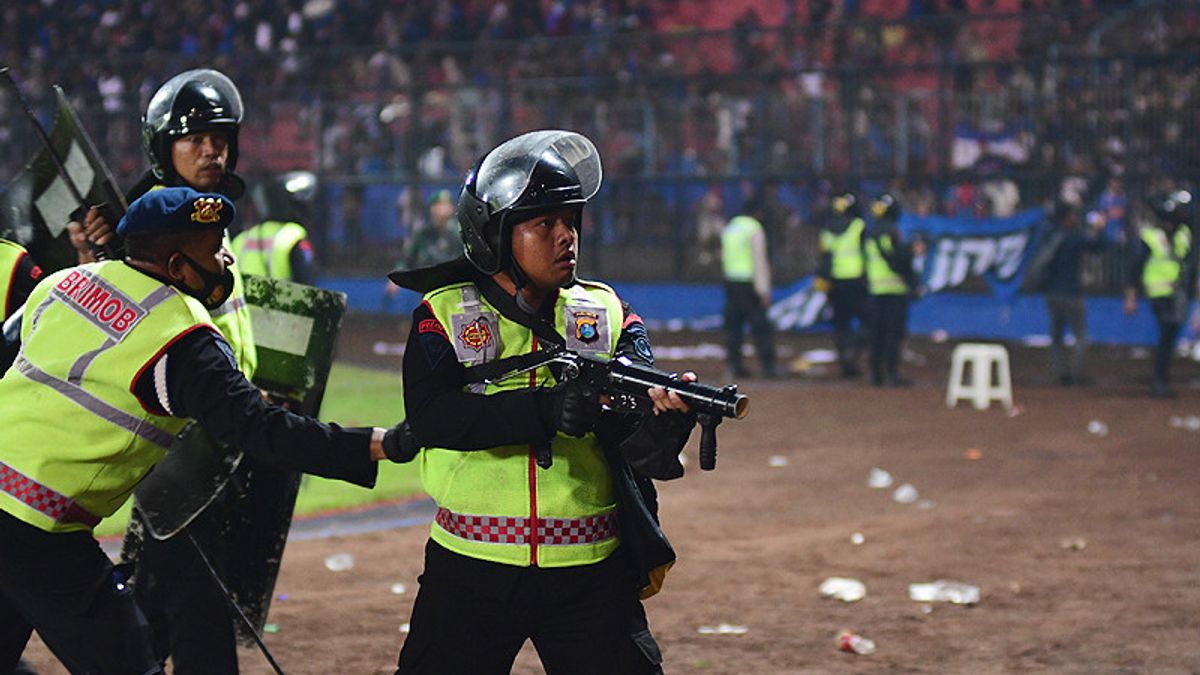JAKARTA – The humanitarian tragedy at the Kanjuruhan Stadium on October 1, 2022 is still capturing the attention of the world community. No longer just the use of tear gas, a number of international mass media began to highlight the reform of the Police due to its failure to overcome mass hysteria.
Police are also considered to often show an unprofessional attitude in dealing with various cases. The practice of bribery and corruption has become commonplace.
As reported by The New York Times on October 3, 2022 in 'Deadly Soccer Clash in Indonesia Puts Police Tactics, and Impunity, in Spotlight'.
The story was written by Sui Lee Wee, head of the Southeast Asia bureau of The New York Times. He was part of the team that won the 2021 Pulitzer Prize in the public service category for coverage of the coronavirus pandemic.
The New York Times wrote: the police always use violence to suppress the masses as if to show unlimited power, and are almost never held accountable for their actions.

In fact, the police in Indonesia have never been as cruel as they are today. During the three decades of Suharto's rule, the military was seen as the most powerful. But after his fall in 1998, as part of a series of reforms, the government handed over responsibility for internal security to the police, giving the police enormous powers.
“To me, this is really a function of the failure of police reform in Indonesia,” said Jacqui Baker, political economist at Murdoch University in Perth, Australia.
For more than two decades, human rights activists and the Ombudsman have investigated the actions of the Indonesian police. These reports, according to Baker, often reach the police chief, but have little or no effect.
“Why do we continue to be faced with impunity?” he says. "Because there is no political interest to actually create a professional police force."
Impunity means freedom from punishment.
“In many cases, police officers have the final say on whether a case should be prosecuted. Taking bribes is commonplace, analysts say. And any allegations of police misconduct are left entirely to high-ranking officials for investigation. Most of the time, rights groups say, they don't,” The New York Times concludes.
Quoting President Jokowi
Another international mainstream media, Bloomberg also wrote the title 'Deadly Soccer Stampede Pressures Jokowi to Revamp Indonesia Police'. Written by Faris Mokhtar on October 4, 2022.
The deadly attack at Kanjuruhan Stadium by police firing tear gas at supporters has further forced President Joko Widodo to overhaul the security forces, which are often criticized for brutality and corruption.
FIFA's ban on the use of tear gas to disperse crowds during football matches is clear. However, the police dodged on the grounds of defending themselves from threats. As a result, 125 people died.
"The action sparked criticism on social media, including flooding the police public relations Twitter page, calling for the resignation of top police officers and those involved in the incident," Bloomberg wrote.
The mass media from the United States quoted Bambang Harymurti, former editor-in-chief of Tempo, “Police actions can trigger calls for reform. And Jokowi's position could be better if he takes a firmer stance and looks at the excessive use of police force."

Bloomberg presented data from the Commission for Missing Persons and Victims of Violence (Kontras), the number of incidents involving police brutality has increased to 677 incidents from 651 in the last two years.
For corruption cases, Indonesia is ranked 96th out of 180 corruption countries in the 2021 International Transparency report, behind countries such as Brazil and Tanzania.
“In 2016, Jokowi said that comprehensive reform of the Indonesian police was the key to face the future. He also urged the police to produce officers that the public trusts. But even with recent incidents involving troops, Jokowi has largely avoided calls for reforms,” citing Bloomberg.
Analysts say moving the police force under a separate ministry could allow for more checks and balances to oversee their powers.
“Police reform requires strong political will from the President and from within the police itself. Which aspects should be reformed? It has to become their cultural practice, changing the profile of responsible officers and mindsets,” said D. Nicky Fahrizal, a researcher at the Center for Strategic and International Studies (CSIS) as written in Bloomberg.
Commitment of the National Police Chief
During his leadership, the National Police Chief General Listyo Sigit Prabowo carried the slogan of the Precision Police (predictiveness, responsibility, and fair transparency).
The words accountability and fair transparency accompany the predictive policing approach which emphasizes that every Bhayangkara personnel is able to carry out Polri's duties quickly and precisely, responsively, humanely, transparently, responsibly, and fairly.
Quoting Tribratanews, there are 8 commitments of the National Police Chief, namely:
- Making the Police as a Precision Institution
- Ensure security to support national development programs
- Maintain internal solidity
- Improving the synergy and solidity of the TNI-Polri, as well as collaborating with law enforcement officers and ministries/agencies to support and oversee government programs
- Support the creation of an ecosystem of innovation and creativity that drives Indonesia's progress
- Demonstrate servant leadership and be a role model
- Prioritizing problem prevention, implementation of restorative justice and problem solving
- Loyal to the Republic of Indonesia and always take care of diversity
The strengthening of the priority transformation program in the Precision Police policy consists of organizational transformation, operational transformation, public service transformation, and supervisory transformation.

All policies in the transformation of the Precision Police are further described in the dimensions of their respective programs, activities and actions.
In a press conference on September 30, 2022, the National Police Chief said, “We are all committed, of course, to take steps to improve and evaluate. Improvements in the structural field, improvements in the instrumental field, and of course the most important thing is in the cultural field."
“Currently, we continue to make efforts to be more aspirational in receiving complaints and complaints from the public. Of course, by responding to the complaints of justice seekers quickly, including the violations we encountered in the field," General Listyo Sigit Prabowo added.
The English, Chinese, Japanese, Arabic, and French versions are automatically generated by the AI. So there may still be inaccuracies in translating, please always see Indonesian as our main language. (system supported by DigitalSiber.id)













